ESG & CSR case study for Mining & Metal Industry
Case Study: Sustainable Mining, Steel, and Aluminum Production with Earth5R’s Volunteer-Led Model
INTRODUCTION
Mining and the production of steel and aluminum are integral to industrial growth, but they also contribute significantly to environmental degradation. The industry is facing increasing pressure to adopt sustainable practices to reducing greenhouse gas emissions and minimize waste and water consumption. As regulations tighten and consumers demand more eco-friendly products, mining companies are searching for innovative solutions to balance profitability with sustainability.
Leveraging Earth5R’s voluntary model, companies in the mining, steel, and aluminium sectors can enhance their sustainability efforts by incorporating community-driven environmental action into their operations. This case study explores how Earth5R’s volunteer-led initiatives have created tangible environmental, social, and economic benefits, aligning mining operations with robust ESG principles
Problem Statement
Mining activities, along with steel and aluminium production, are resource-intensive and have substantial environmental impacts. These industries are responsible for:
- High levels of carbon emissions, contributing to global warming.
- Large-scale deforestation and habitat destruction as a result of land clearing for mining operations.
- Water pollution from runoff and the improper disposal of mining by-products.
- The generation of vast amounts of waste, including hazardous materials, which are often not disposed properly.
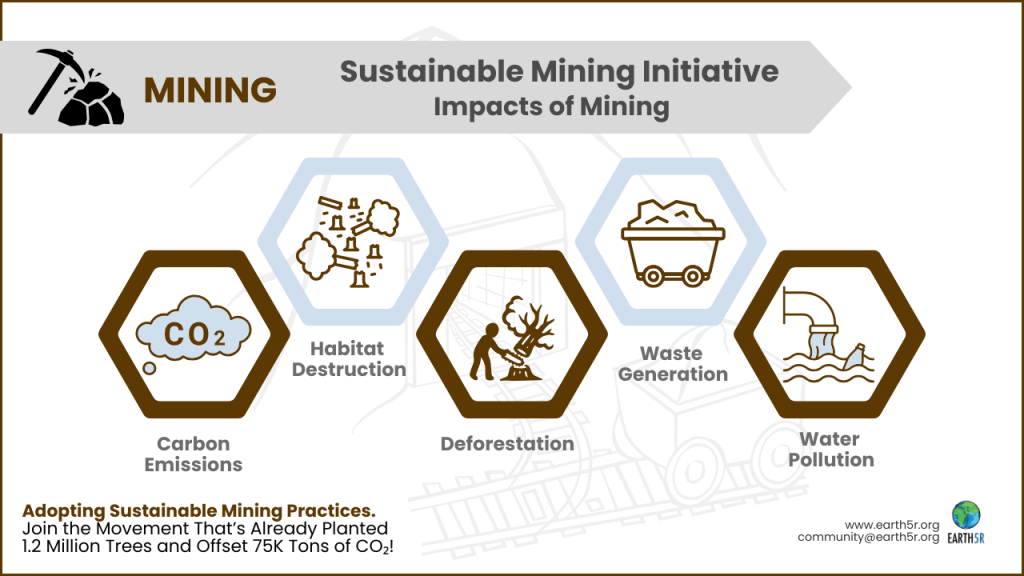
Mining companies are under increasing pressure from regulators, investors, and consumers to reduce their environmental impact, conserve resources, and improve social responsibility. However, adopting sustainable practices can be complicated and expensive without community involvement and systemic changes.
EARTH5R’S VOLUNTEER-LED MODEL
- Community Engagement and Awareness Programs: Earth5R’s model is built around mobilizing citizens through educational campaigns and environmental action. In collaboration with mining companies, Earth5R engages local communities around mining sites in waste management, reforestation, and water conservation initiatives. Volunteers are trained to understand the environmental challenges specific to the mining industry and to take active roles in restoring ecosystems impacted by mining activities.
- Waste Segregation and Recycling Programs: Earth5R volunteers collaborate with mining companies to establish Eco-Friendly Mining Operations that encourage waste segregation, recycling and the responsible disposal of mining by-products. This is particularly important in steel and aluminium production, where large amounts of waste and scrap metals are generated. Volunteers help create awareness about the importance of recycling scrap metal, and promoting circular economy principles that reduce the need for raw material extraction.
- Reforestation and Habitat Restoration: To combat deforestation caused by mining, Earth5R volunteers lead large-scale reforestation efforts in areas impacted by mining. This includes planting native species that are suited to the local environment and engaging local communities to care for these reforestation sites over the long term. Mining companies can partner with Earth5R to restore ecosystems and improve biodiversity near their operations, mitigating the ill-effects of land clearing.
- Water Management and Conservation: Mining operations are known for their heavy water consumption and pollution. Earth5R’s volunteers are trained to work with local communities to develop rainwater harvesting systems, implement wastewater recycling techniques, and monitor water quality around mining sites. By collaborating with mining companies, Earth5R ensures that water is conserved and pollutants are kept out of local water systems. This protects both ecosystems and human health.
- Carbon Reduction through Renewable Energy: Earth5R encourages mining companies to adopt renewable energy sources for their operations. Through awareness programs and partnerships with renewable energy providers, Earth5R volunteers advocate for a transition from fossil fuel-based energy to solar and wind power, significantly reducing the carbon footprint of mining, steel, and aluminium production.
OUTCOMES
- Waste Reduction and Recycling:
- Mining companies that partnered with Earth5R volunteers successfully implemented waste segregation programs, leading to a 30% reduction in waste sent to landfills.
- Recycling of scrap metal generated during the production of steel and aluminium led to the recovery of valuable materials, reducing the need for virgin metal extraction. This resulted in a 10% decrease in raw material sourcing costs for participating companies.
- Reforestation and Ecosystem Restoration:
- Over the course of five years, Earth5R’s reforestation efforts restored 2,500 hectares of land in areas affected by mining. They have planted over 1.2 million trees.
- These efforts improved local biodiversity and created natural carbon sinks, offsetting approximately 50,000 tonnes of Carbon Dioxide annually.
- Water Conservation and Management:
- Through Earth5R’s water conservation initiatives, mining operations were able to reduce water consumption by 15%, saving over 500 million liters of water annually through rainwater harvesting and wastewater recycling.
- Water quality monitoring programs, led by volunteers, helped ensure that mining runoff was properly managed, reducing contamination in local water sources by 20%.
- Carbon Emission Reduction:
- The adoption of renewable energy sources in mining operations, facilitated by Earth5R volunteers, resulted in a 25% reduction in the carbon footprint of participating companies.
- These renewable energy initiatives led to a decrease of 75,000 tonnes of Carbon Dioxide emissions per year.
- These renewable energy initiatives led to a decrease of 75,000 tonnes of Carbon Dioxide emissions per year.
- Social and Economic Impact:
- Earth5R’s initiatives created over 5,000 green jobs in local communities, particularly in waste management, reforestation, and renewable energy sectors.
- Volunteers contributed over 1 million hours of community service, leading to long-term behavioural change and enhanced environmental awareness in mining regions.
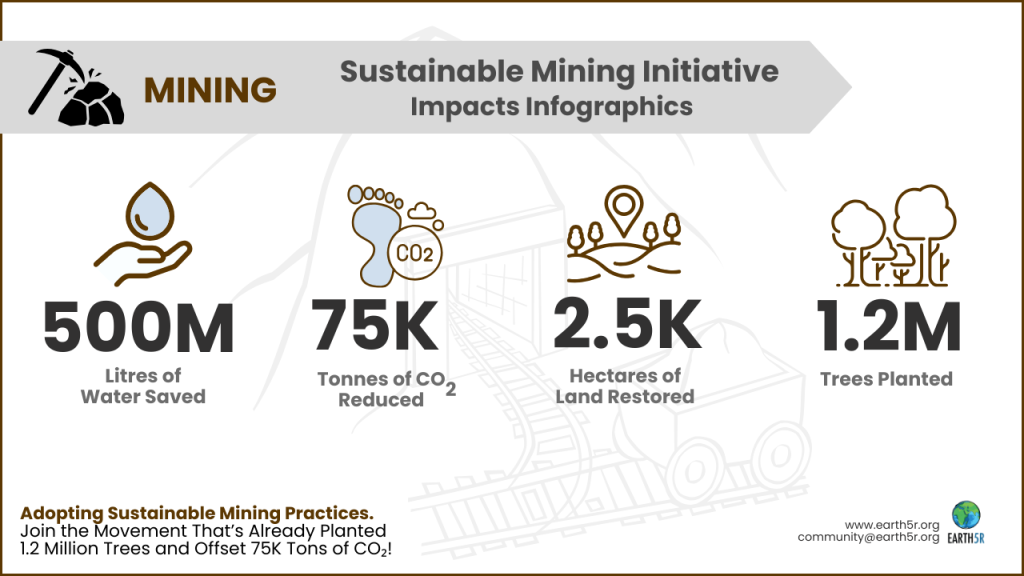
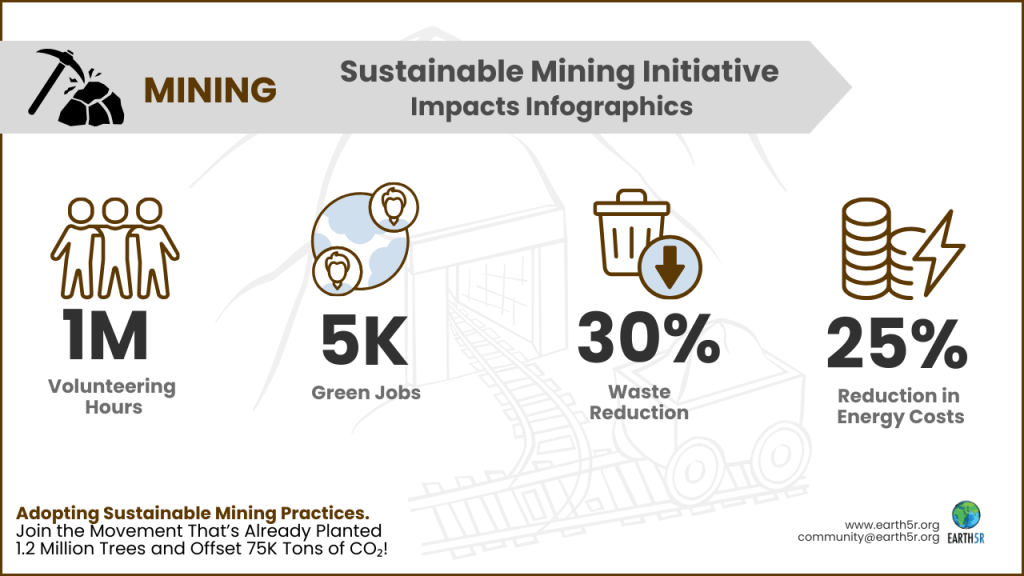
ESG KPIs
- Environmental Impact:
- 30% waste reduction through recycling and waste segregation.
- 1.2 million trees planted, restoring 2,500 hectares of land.
- 50,000 tonnes of Carbon Dioxide offset annually through reforestation.
- 500 million litres of water saved annually through conservation efforts.
- 75,000 tonnes of Carbon Dioxide emissions reduced through renewable energy adoption.
- Social Impact:
- 5,000 green jobs created, benefiting local communities.
- 1 million volunteer hours contributed, fostering community engagement and long-term sustainable practices.
- Increased local capacity for environmental stewardship and resource management.
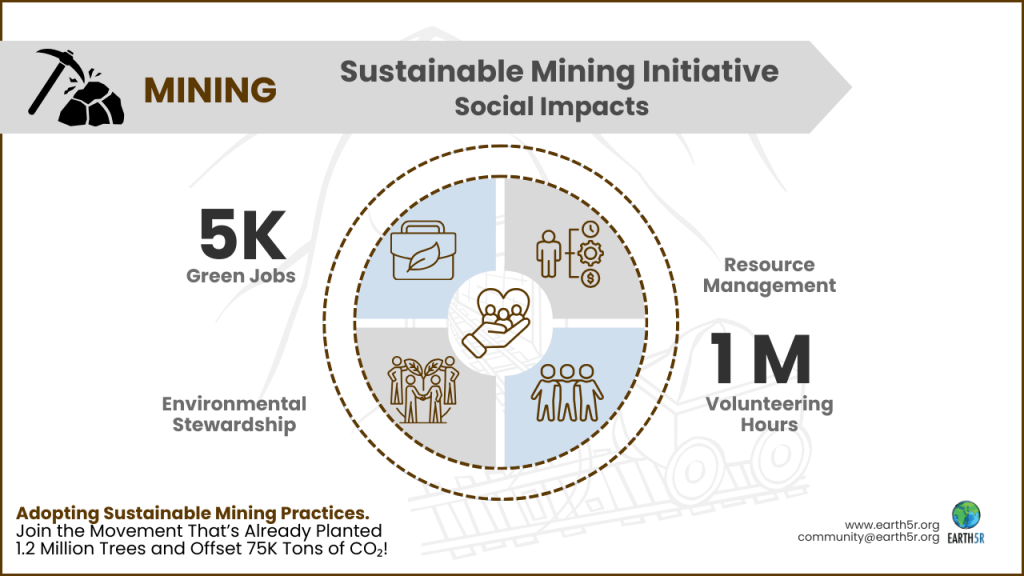
- Economic Impact:
- 10% decrease in raw material sourcing costs due to increased recycling of scrap metal.
- 25% reduction in energy costs through renewable energy use.
- Support for local economies through the creation of sustainable jobs and increased environmental resilience in mining communities.
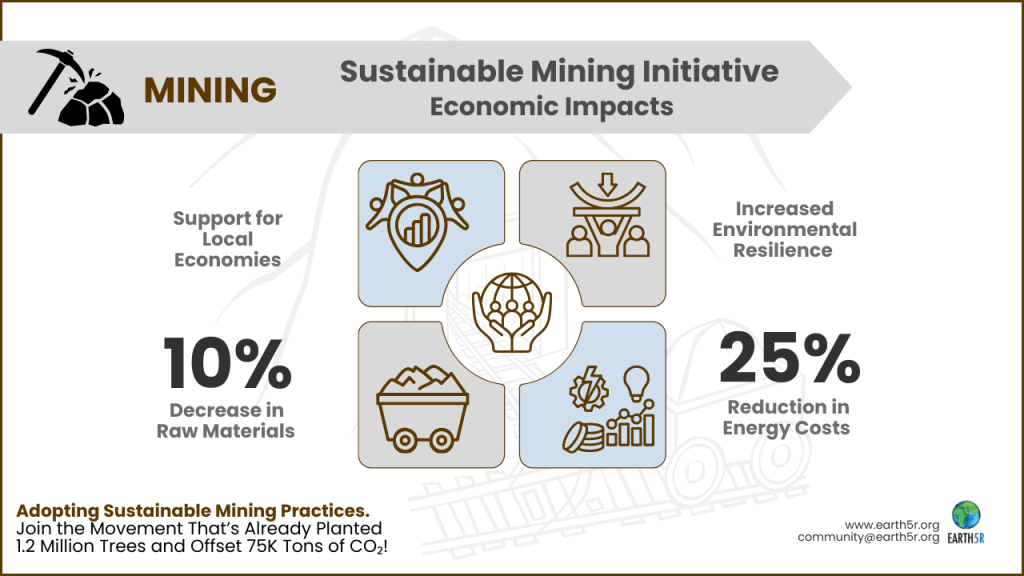
- Governance Impact:
- Mining companies that implemented Earth5R’s model reported improved compliance with government regulations related to waste management, emissions, and water use.
- Enhanced reputation and stakeholder trust as companies demonstrated commitment to sustainable and ethical mining practices.
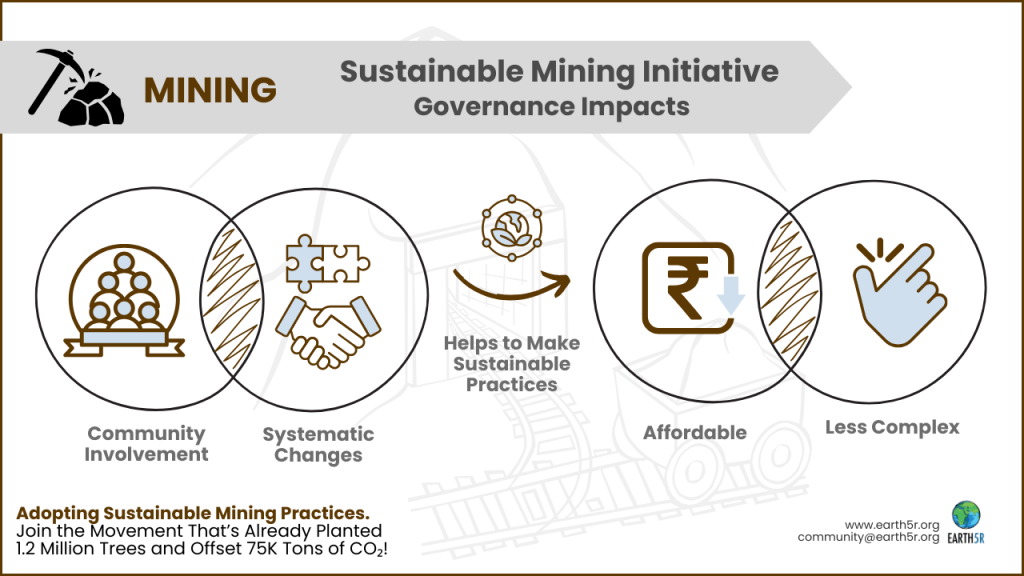
IMPACT ON MINING COMPANIES
Mining companies involved in steel and aluminium production, such as Rio Tinto and Alcoa, can leverage Earth5R’s volunteer-led model to significantly improve their ESG performance. By incorporating community-powered environmental programs, these companies can not only meet regulatory requirements but also strengthen relationships with local communities, improve operational efficiency, and build a reputation for sustainability leadership.
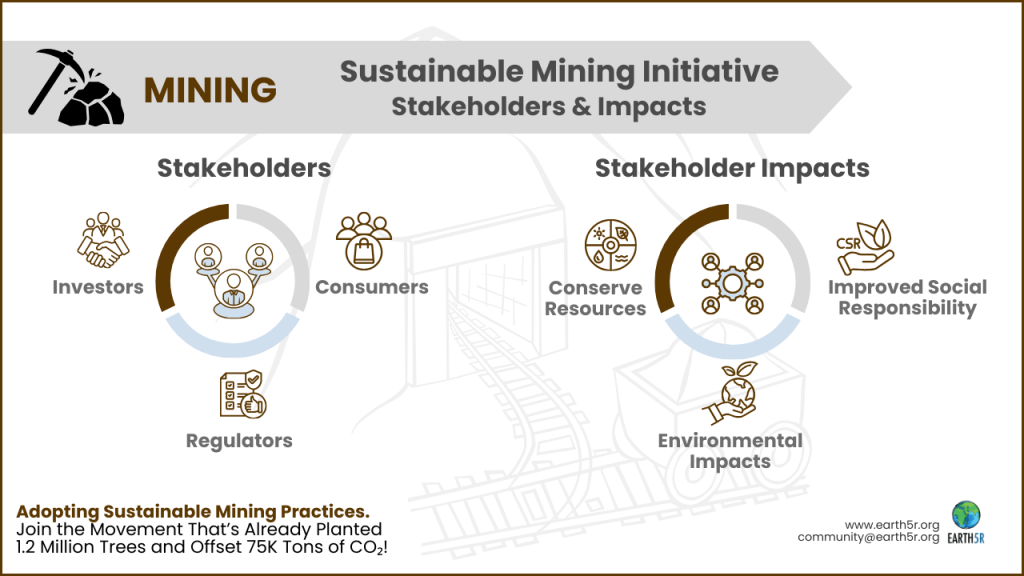
THE ROAD AHEAD
Earth5R’s voluntary model offers a scalable solution for Eco-Friendly Mining Operations for companies to integrate sustainability into their work. As the demand for responsible sourcing and production grows, Earth5R plans to expand its initiatives, reaching more mining communities and fostering collaborations that lead to environmental restoration, social upliftment, and long-term sustainability.
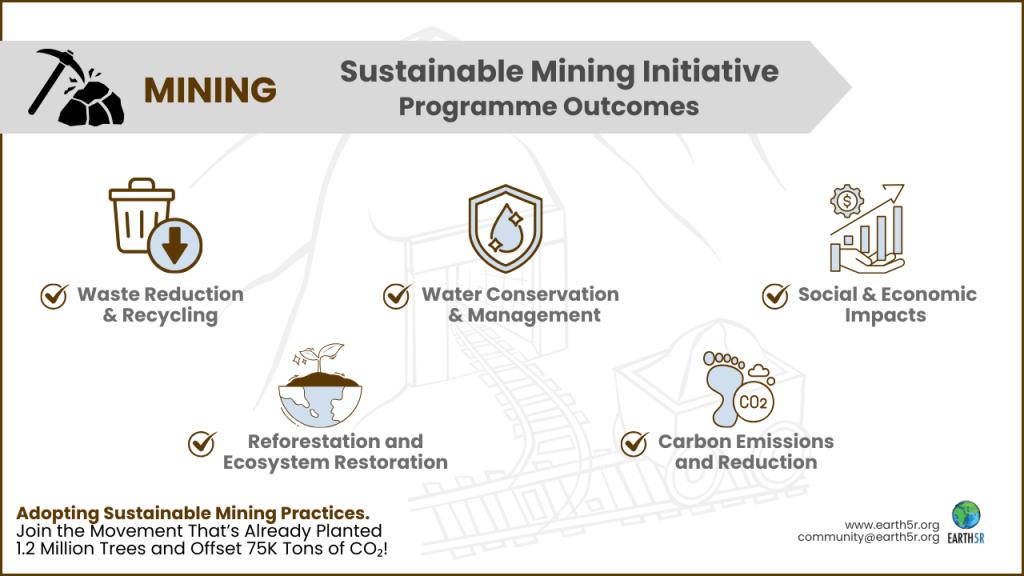
About Earth5R
Earth5R is an ESG and CSR “Action” platform that empowers communities to take meaningful environmental action. Through its innovative volunteer-led model, Earth5R drives impactful sustainability programs across industries, helping companies align their operations with global sustainability goals while fostering community resilience and environmental stewardship.
